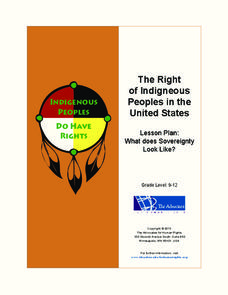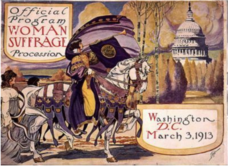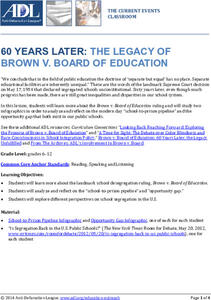Advocates for Human Rights
The Right of Indigneous Peoples in the United States
The sovereignty of U.S. Native American nations is the focus of a resource that asks class members to compare the Right to Self-Determination in the UN Declaration on the Rights of Indigenous Peoples with a fact sheet that details the...
Anti-Defamation League
Identity and Diversity in My Generation
Gen Z, those born between 1997 and 2012, according to research, is the "most racially and ethnically diverse generation in U.S. history." Gen Z high schoolers are challenged to consider how they identify themselves. They select a photo...
University of California
Equal Rights? The Women's Movement from Suffrage to Schlafly
If you've never heard of the Equal Rights Amendment, it's probably because there isn't one in the United States Constitution. Delve into the contentious history behind the ERA, its founders and supporters, and reasons for its political...
Curated OER
The Women’s Suffrage Movement
A set of lessons about the women's suffrage movement will bring history to life for your middle schoolers. Learners study primary documents, learn about famous suffragettes, and compare the suffrage movement to current events...
Curated OER
Importance and History of Ecological Conservation
Discuss and analyze a variety of information regarding the history of ecological conservation and preservation, as well as its importance. Scholars work in groups to complete four different activities, then report back to the class for a...
Center for Civic Education
Women's History Month Word Clouds
What a great idea for celebrating Women's History Month and discovering the amazing efforts that individuals have put forth on behalf of women's rights! Learners take a closer look at the speeches and other primary source documents of...
PBS
Pearl Harbor and the Internment of Japanese Americans during World War II
Balancing national security and civil liberties can be tricky. To appreciate the tension between these two concepts, class members investigate the Japanese attack on the U.S. Naval Base at Pearl Harbor and President Franklin D....
K20 LEARN
Tribal Sovereignty and the Indian Reorganization Act: Tribal Governments
Sovereign nations or wards? High schoolers investigate the history of the Indian Reorganization Act and other legislation that impacted Native Americans. They also research different tribes' constitutions, compare them to the U.S....
K20 LEARN
Allotment in Indian Territory: Land Openings in Indian Territory
To understand how the allotment policy embedded in the Dawes Act, passed by the U.S. government in 1887, affected the tribal sovereignty of Native Americans, young historians examine various maps and documents and Supreme Court cases...
San Francisco Symphony
Music Reflects History
Exploring the baroque era can be exciting and fun when it's done thorugh the arts. Middle schoolers examine the music and art history of the baroque era through research. They use their findings and class notes to create an expository...
Anti-Defamation League
60 Years Later: The Legacy of Brown v. Board of Education
Although the 1954 U.S. Supreme Court decision Brown v. Board of Education declared segregated schools unconstitutional, huge inequalities still exist in U.S. public schools. Learners analyze and discuss data presented in two...
Education World
Now Let Me Fly -- A Black History Reader's Theater Script
Young scholars study African American history, Jim Crow laws, and seperate but equal statutes by performing a Reader's Theater script. They perform Marcia Cebulska's, Now Let Me Fly, which may be requested online.
TCI
Ain't I a Woman?
Learners discover the impact of women on civil rights in United States history by analyzing primary source clues to identify influential female figures.
Constitutional Rights Foundation
Naturalized Citizens and the Presidency
Article II, Section 1 of the U.S. Constitution takes center stage in a lesson that asks class members to assume the role of state senators, debate a resolution to amend the U. S. Constitution to permit naturalized citizens to run for...
Smithsonian Institution
Arts of the Islamic World
Learn more about the history and five pillars of Islam with an extensive resource that focuses on the religion's connection to art. Focusing on calligraphy, textiles, and architecture, the packet illustrates the beauty of the artistic...
Southern Poverty Law Center
Teaching Hard History: A Framework for Teaching American Slavery
Pupils investigate American slavery from colonial times through the Civil War. They incorporate primary sources, video clips, and firsthand accounts to understand how the slavery issue gripped the nation. Essays, presentations, and...
American Institute of Physics
African American Inventors in History
A two-part lesson plan introduces young historians to the work of famous African American inventors. Groups first research and develop a presentation of an inventor that includes biographical information and information about one of...
Anti-Defamation League
Columbus Day or Indigenous Peoples Day?
"Columbus Day"? Indigenous Peoples' Day"? "Native Americans' Day"? The controversy over what to call the federal holiday celebrated on the second Monday in October is the focus of a lesson that asks high schoolers to consider various...
Curated OER
Race, Education, and Income: Comparing Carter & Reagan
High school learners compare economic outcomes for 3 racial groups under the presidencies of Jimmy Carter and Ronald Reagan by analyzing a series of graphs, answering questions from a worksheet, and participating in a discussion.
Smithsonian Institution
Cuban Missile Crisis
The United States—specifically John F. Kennedy—played a large role during the Cuban Missile Crisis. A history resource poses questions that encourage critical thinking as well as in-depth analysis of images from the time period.
Administrative Office of the US Courts
US v. Alvarez
Is it illegal to lie about military service? Discuss the ways the First Amendment affects the Stolen Valor Act with a lesson that focuses on the Supreme Court case U.S. v. Alvarez. As high schoolers learn more about the history of the...
West Virginia Department of Education
The Debate - John Brown: Martyr or Madman?
Did he die for a cause, or was he crazy? Although the resource discusses John Brown and West Virginia history, many historical figures have the same reputation. Teach learners about different perspectives and highlight the importance of...
Museum of Tolerance
The Pursuit of Democracy and Diversity: The Trial of Pro-Social Injustice in Historical Documents and Accounts
Class members investigate The Indian Removal Act of 1830, U.S. Theft of Mexican Territory Timeline, and President Abraham Lincoln’s letter to Horace Greeley, 1862, and then conduct a mock trial of each of these documents to determine...
Constitutional Rights Foundation
Women in the Military
Scholars analyze the role of women in the military in United States history. Using group research, debate, and diary entries, they explore various military activity in America. To complete the lesson, young historians write an essay...
Other popular searches
- U.s. History 1920s
- U.s. History Progressive Era
- U.s. History 1950's
- U.s. History Immigration
- U.s. History Colonial Period
- U.s. History Grades
- Women in u.s. History
- Current u.s. History
- U.s. History &Geography
- U.s. History + 1930
- U.s. History + Depression
- U.s. History 1920s Airplanes

























